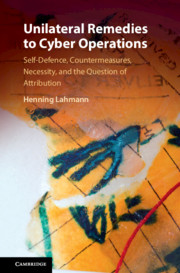 Unilateral Remedies to Cyber Operations
Unilateral Remedies to Cyber Operations Book contents
- Unilateral Remedies to Cyber Operations
- Unilateral Remedies to Cyber Operations
- Copyright page
- Dedication
- Contents
- Preface
- Acknowledgements
- Part I Cybersecurity Incidents and International Law
- Part II Unilateral Remedies to Cybersecurity Incidents
- Part III Outlines of an Emergency Regime for Cyberspace
- 7 Transnational Cybersecurity, Unilateral Remedies, and the Rule of Law
- 8 ‘Such Incidents Might Recur at Any Time’
- 9 Possible Elements of the Cyber Emergency Regime
- 10 Concluding Remarks
- Bibliography
- Index
7 - Transnational Cybersecurity, Unilateral Remedies, and the Rule of Law
from Part III - Outlines of an Emergency Regime for Cyberspace
Published online by Cambridge University Press: 31 March 2020
- Unilateral Remedies to Cyber Operations
- Unilateral Remedies to Cyber Operations
- Copyright page
- Dedication
- Contents
- Preface
- Acknowledgements
- Part I Cybersecurity Incidents and International Law
- Part II Unilateral Remedies to Cybersecurity Incidents
- Part III Outlines of an Emergency Regime for Cyberspace
- 7 Transnational Cybersecurity, Unilateral Remedies, and the Rule of Law
- 8 ‘Such Incidents Might Recur at Any Time’
- 9 Possible Elements of the Cyber Emergency Regime
- 10 Concluding Remarks
- Bibliography
- Index
Summary
This chapter explains how both the attribution problem and the doctrine of necessity as an emergency rule that creates an exception weaken the rule of law in cyberspace. Therefore, necessity is not capable of serving as a stable legal basis for frequently recurring incidents.
- Type
- Chapter
- Information
- Unilateral Remedies to Cyber OperationsSelf-Defence, Countermeasures, Necessity, and the Question of Attribution, pp. 261 - 266Publisher: Cambridge University PressPrint publication year: 2020
